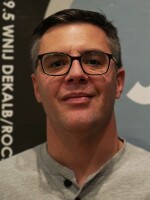Actor William Shatner will be in Rockford this Sunday to perform his one man show. Jason Cregier spoke to him by phone ahead of the event.
Jason Cregier: What is it about performing in front of a live audience that you enjoy the most?
William Shatner: The spontaneity of it. I don't work off a prepared script. We get laughs, sorrow, make mistakes, say nonsense. It becomes entertaining to me. We all enjoy something together because of that sort of spontaneous thing, if actors — myself included — could have that improvisational feel to dialogue that's been written, you then become the great actors of the world, because it then becomes a part of you. Whatever it is, you have to say, to be, or not to be, it becomes you. And that's what acting is all about. So, if you could apply the laws of spontaneity to something that's prepared, I think you have magic.
So, are you able then to draw quite a bit of energy from the audience and play with that?
Always. Laughter is a great way of judging how the audience is attending, and turgid drama, so that you can hear them listening. You know, I sometimes tell the story of going hunting for wallabies in Australia. Lying in the field at night, waiting for the Wallaby to come out. That silence is the audience, what's going to happen? And you'd hear them listening. You're telling a ghost story. It's part of the fun of being in front of an audience.
Many people know you went into space on Blue Origin. What is it about space that continues to fascinate humankind?
Well, the obvious answer is, space is the final frontier. It really isn't. Such a great phrase, "space, the final frontier." Death, the final frontier. It’s all a mystery. We know so little. There was a lot of speculation in Aristotle's time as to what was out there. What were those points of light? I remember someone talking about the in the Middle Ages, somewhere around there, someone had written that there's a blanket over the sky. And those little pinpricks in the blanket, because there's light outside that blanket, that’s what those stars represent. There was so much mystery and lack of knowledge when there wasn't a telescope. And then along comes Galileo. And he said, "wait a minute, we don't know that the sun doesn't go around us. We go around the sun." And they almost killed him because of that. There's this mystery of what space is. About 100 years ago, somebody said, "you know what, there was a pinpoint of energy and it exploded and made the universe." "What the hell are you talking about?" people said. We accept the Big Bang, as ordained, but it may not be, it's purely a theory.
How would you describe your legacy?
Legacy is a non-entity. Legacy doesn't exist. My wonderful friend Leonard Nimoy died a few years ago. He was a very popular actor. He did a lot of wonderful things. But everything erodes, statues are felled and buildings decay and signs blow down. Nothing. Nothing is legacy. The pyramids — what did they do? They opened the thing, and it's all rotting, and all the facing is taken away. Nothing is legacy. The only thing that you can leave behind, and I mean this sincerely, is good deeds. Because they reverberate forever. You help somebody and that person goes on to whatever they do. They help somebody else, or they don't, or they do something criminal, or they do whatever it is. A good deed reverberates, like the butterfly wings, forever.
William Shatner will be performing at Rockford's Coronado Performing Arts Center on Sunday at 7:30 p.m.


